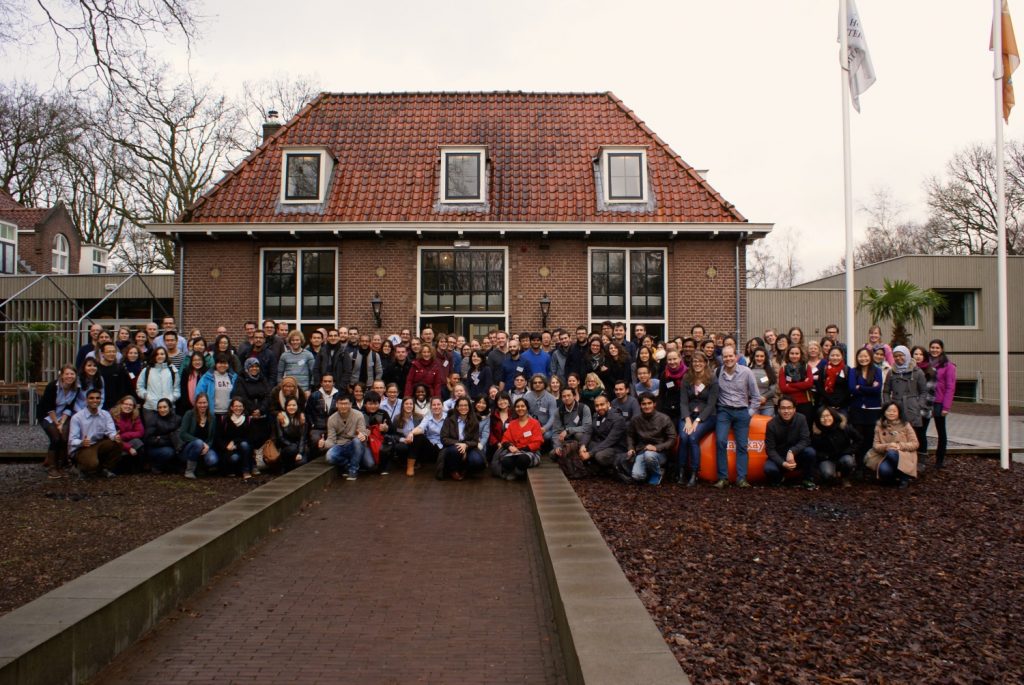By Hanna Rovenich and Setareh Mohammadin of the EPS PhD council.
Benefits of a Netherlands-wide multi-university graduate school
The interuniversity Graduate School ‘Experimental Plant Sciences‘ (EPS) trains over 300 PhD candidates at any given time across seven different universities including Wageningen University, Radboud University Nijmegen, the Free University of Amsterdam, the University of Amsterdam, Leiden University, Utrecht University, and the University of Groningen. Since EPS was founded in 1992, its mission has not only been the organization of the training of PhDs but the coordination of plant-related research of all those collaborating universities. This means that PhD candidates in EPS have access to seminar series that are broadcasted among the different universities and many networking opportunities, for example, at annual theme days. In addition, EPS provides science-related courses where PhDs can deepen their knowledge on particular methodologies relevant to their topics but also courses for personal skill development.
However, PhD candidates are also members of local graduate schools with their own rules and regulations, so in some sense the EPS doubles the amount of paper work and requirements to be fulfilled. Especially for PhDs coming from abroad, the amount of administrative paperwork a new PhD candidate is confronted with is oftentimes overwhelming.

In order to represent and provide support to the entire group of EPS PhD candidates, a group of fellow PhDs formed the first PhD council more than 15 years ago. Since then, every year or two, new PhDs replace previous members on a voluntary basis. Today, we are a group of 10 PhD candidates from 3 of the 7 EPS universities. Contact us here and by email eps.phd.council@gmail.com. Our main interest is the well-being and satisfaction of EPS PhD candidates. We act as a mediating body between PhDs and EPS administration and participate in the quality assessment of the PhD program. In addition, we provide the means for EPS PhD candidates to meet on a regular basis. Together with occasional volunteers, we have organized visits to (inter)national breeding companies and workshops on creative thinking, scientific integrity, supervision, writing and presentation skills. All of these events have been well received and are well attended.
Get2Gether: an interactive retreat for PhDs by PhDs
In the past, the EPS curriculum included a single-day seminar event filled with talks by PhDs, and a social gathering at the end of the day that was organized by the PhD council. Over the years, we have noticed a decrease of interest in those days! Following a survey, it became apparent that most PhDs would be interested in a more science/career-based two-day event instead. Therefore, we set out to organize the first two-day EPS PhD retreat, called Get2Gether, at the end of January 2015. In response to requests made by PhDs in the survey, the program of the retreat was composed of keynotes by leading plant scientists, PhD talks, and presentations by scientists who have left academia and made a career in industry, education, or the publishing sector. Career-oriented workshops added a very interactive component to the whole program. Workshop topics included CV writing, student supervision, tips and tricks on academic writing, and elevator pitches (i.e. how to present one’s project in just two minutes). In addition, there was ample time for PhDs to interact among themselves but also with invited speakers during coffee breaks, lunches, dinner, a pub quiz and party in the evening of the first day. The whole event was very well attended with over 140 participants. PhDs particularly liked the workshops and career-oriented talks. Most of the funding for the Get2Gether was provided by EPS and the local Graduate School of Life Sciences from Utrecht University, but we also received some additional funding from industry. According to the evaluation, the Get2Gether was a big success and will therefore be established as a regular EPS event from now on!
Hanna Rovenich is a PhD candidate in the Laboratory of Phytopathology at Wageningen University. She studies the molecular mechanisms underlying plant-microbe interactions, with a particular focus on protein-protein interactions and their function. Hanna was part of the EPS PhD council for the past two years and chaired the council during the last year. Her interests include science communication and outreach. Find Hanna on Twitter @rovenich.
Setareh Mohammadin is a PhD candidate in the Biosystematics group of the Wageningen UR. She works on the comparative genomics and transcriptomics of the plant family Brassicaceae, using a varying range of bioinformatic tools. Other interests are science communication, organising events and the influence of science on the public. Find Setareh on Twitter @SetarehTwitareh.

